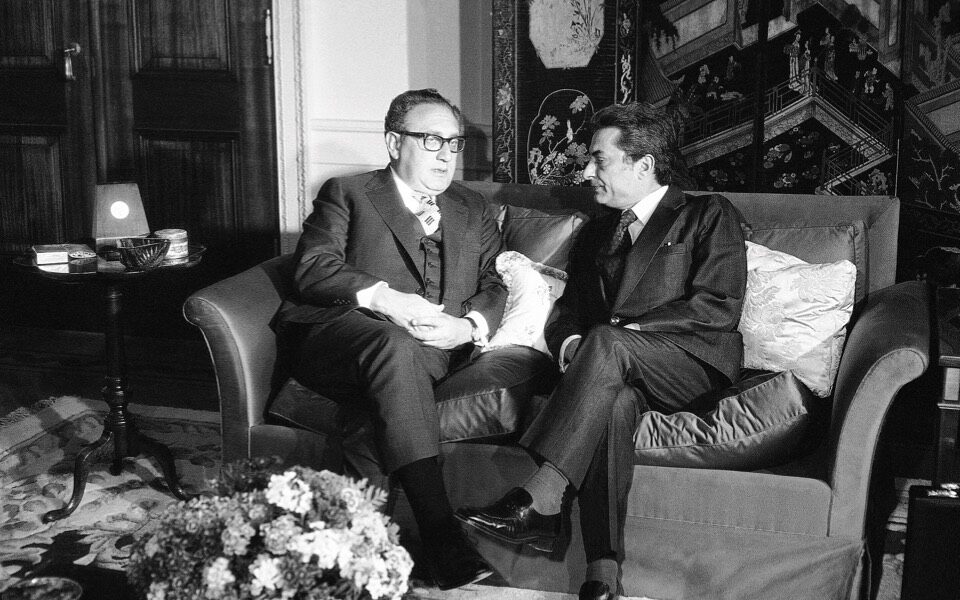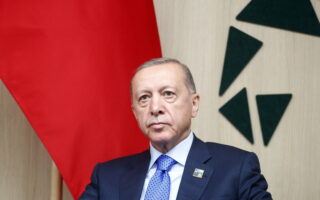Kissinger and the arms embargo on Turkey
The former top US diplomat tried to bypass the sanctions on Ankara imposed for using American weapons in the invasion of Cyprus

Henry Kissinger, the former US secretary of state and national security adviser who died on November 29, was a “red flag” for the Greeks and the diaspora, as he was viewed as largely responsible for the attitude that the United States and NATO adopted toward Turkey following its invasion of Cyprus. The revelations in the book “A Dark Room, 1967-1974,” by Kathimerini Executive Editor Alexis Papachelas, highlight the role of the then US secretary of state, both with his plan to persuade the Greek junta not to react to the invasion, by leaking information that Turkish soldiers had been ordered not to shoot, as well as his statement before the second round of the invasion that “there is no American reason why the Turks should not have a third of Cyprus.”
The attitude of the US toward the invasion caused a strong wave of anti-Americanism, which was also strongly manifested across the Atlantic by the Greek diaspora. On August 18, 1974, more than 30,000 Greek-Americans demonstrated near the White House, chanting “Kissinger, murderer.” The powerful American secretary of state believed that the influence of the Greek-American lobby posed obstacles to the promotion of the policy he desired. For him, the imposition of an embargo on the supply of armaments to Turkey by the American Congress was also the result of the pressure exerted by the Greek diaspora.
A year after the invasion, on July 30, 1975, then Greek Premier Konstantinos Karamanlis, together with then Foreign Minister Dimitris Bitsios and his office director, Petros Molyviatis, met with US President Gerald Ford and Henry Kissinger in Helsinki. Molyviatis remembers Kissinger complaining to Karamanlis about the Greek diaspora’s reactions toward him. “Karamanlis, turning his back to Kissinger and speaking to Ford, but responding to the complaints that had just been made by the American secretary of state, said: ‘They are American citizens. they can do whatever they want.’”
Defense deals
At the beginning of 1975, the process for revising the Greek-American defense agreements had been activated in light of the new developments in bilateral relations. Bitsios, in his book “Beyond the Borders, 1974-1977,” underlines that “Greek-American relations had been tested by Washington’s tolerance toward the Turkish invasion of Cyprus. Consequently, Karamanlis, outlining the objectives of the negotiations, determined that only those that contributed to Greece’s defense needs would be maintained from the American military facilities.”
Tough negotiations followed between Athens and Washington on the framework of the new agreement. And while at the beginning of 1976 the process entered the stage of a final review of what was agreed, it was revealed that, at the same time, negotiations were under way between the US and Turkey for a new defense agreement, which was accompanied by an obligation for the US to pay Turkey 1 billion dollars over four years. Bitsios describes this US-Turkish defense agreement and provision for financial aid as Kissinger’s way of circumventing the arms embargo on Turkey, which had been imposed by the US Congress because during the invasion of Cyprus the Turkish armed forces had illegally used American weapons that had been given to them for the purposes of NATO.
The Greek government reacted by suspending negotiations with the US. “The tactic of American diplomacy to simultaneously negotiate new defense agreements with Greece and Turkey and use double standards was completely unbecoming,” Bitsios says in the book.
The recall of the Greek delegation and Bitsios’ delivery of a letter to Kissinger, in which it was made clear that “Greek tolerance toward his policy had reached its limits,” brought results, as “Kissinger understood that the time of reckoning had come.” In a meeting with the then Greek ambassador to Washington, the US secretary of state made an important statement in order to appease Athens’ concerns: “If you mean the use of military force, we will oppose it and support you,” according to Bitsios’ book.
Athens, having adjusted its strategy to the new circumstances, set two goals: to secure written assurances that the US would prevent aggressive action by Turkey in the Aegean and, at the same time, to secure 700 million dollars in aid as compensation for the aid provided for in the agreement with Turkey, in order to maintain the balance of power in the Aegean. On April 15, 1976, the text that defined the framework of the Greek-US defense cooperation for the next four years was signed at the State Department, with a series of provisions for the operation of the American military bases and the provision for military aid totaling 700 million dollars over a period of four years.
The signing was preceded by a letter from Kissinger to Bitsios, in which the American diplomat satisfied Athens’ claim and stated, regarding the US attitude toward conflicts in the Eastern Mediterranean and the Aegean, that “the United States will actively and unreservedly oppose the pursuit on one side or the other of a military solution and will make a great effort to prevent such a development.”





